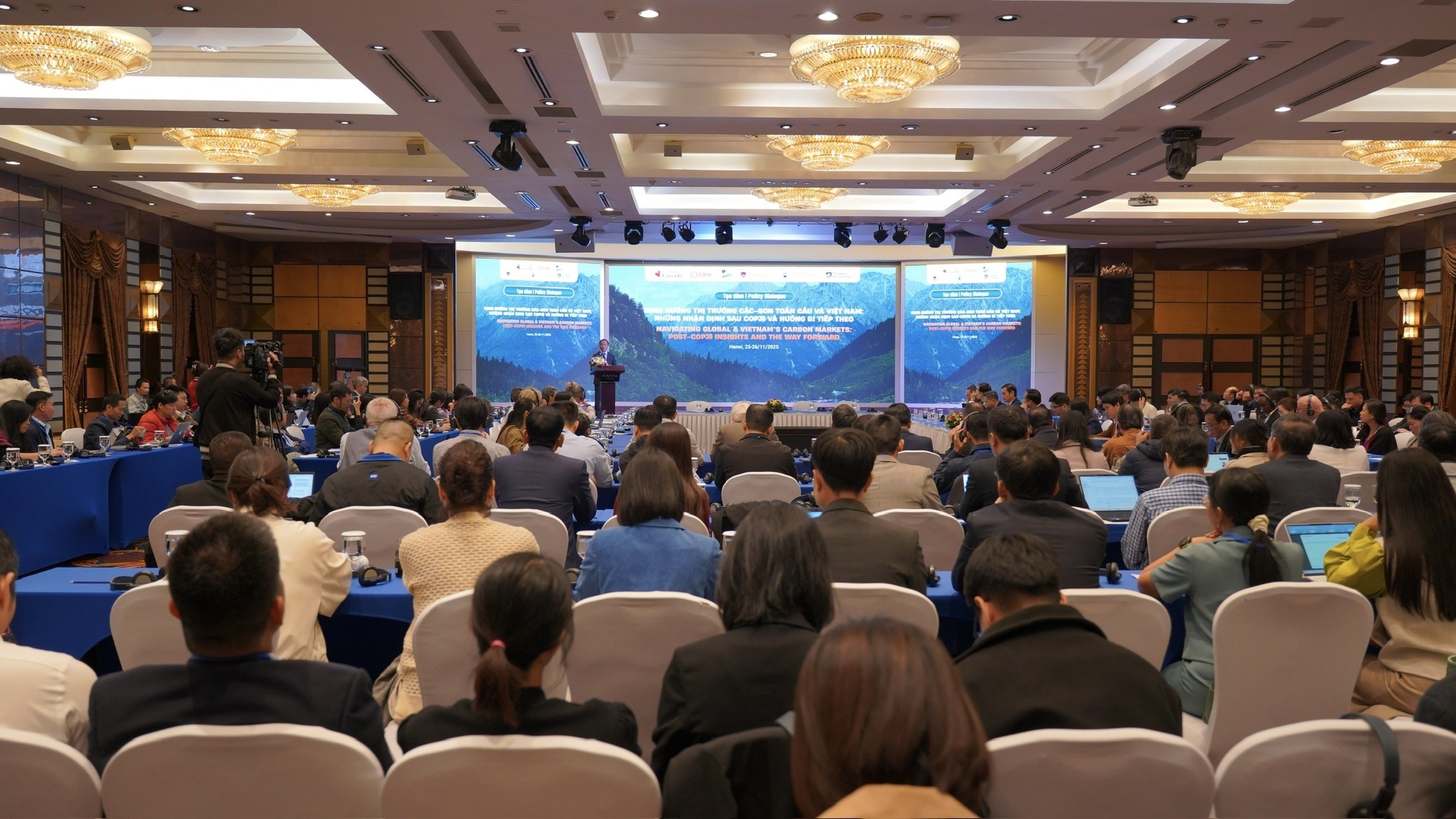
Overview of the conference Source: Khoa Kinh tế Phát triển - UEB - VNU
On November 25–26, 2025, the University of Economics – Vietnam National University, Hanoi (VNU-UEB), in collaboration with Flinders University and the Carbon For Good Project (CARE, CIFOR, University of British Columbia), organized the international workshop “Navigating Global and Vietnam's Carbon Market: Post COP30 insights and the way forward.”
The event brought together domestic and international experts, policymakers, businesses, and development organizations to discuss the future of the carbon market in the new global context. KLINOVA was also honored to have two experts contribute in-depth analyses and practical perspectives on Vietnam’s carbon market.
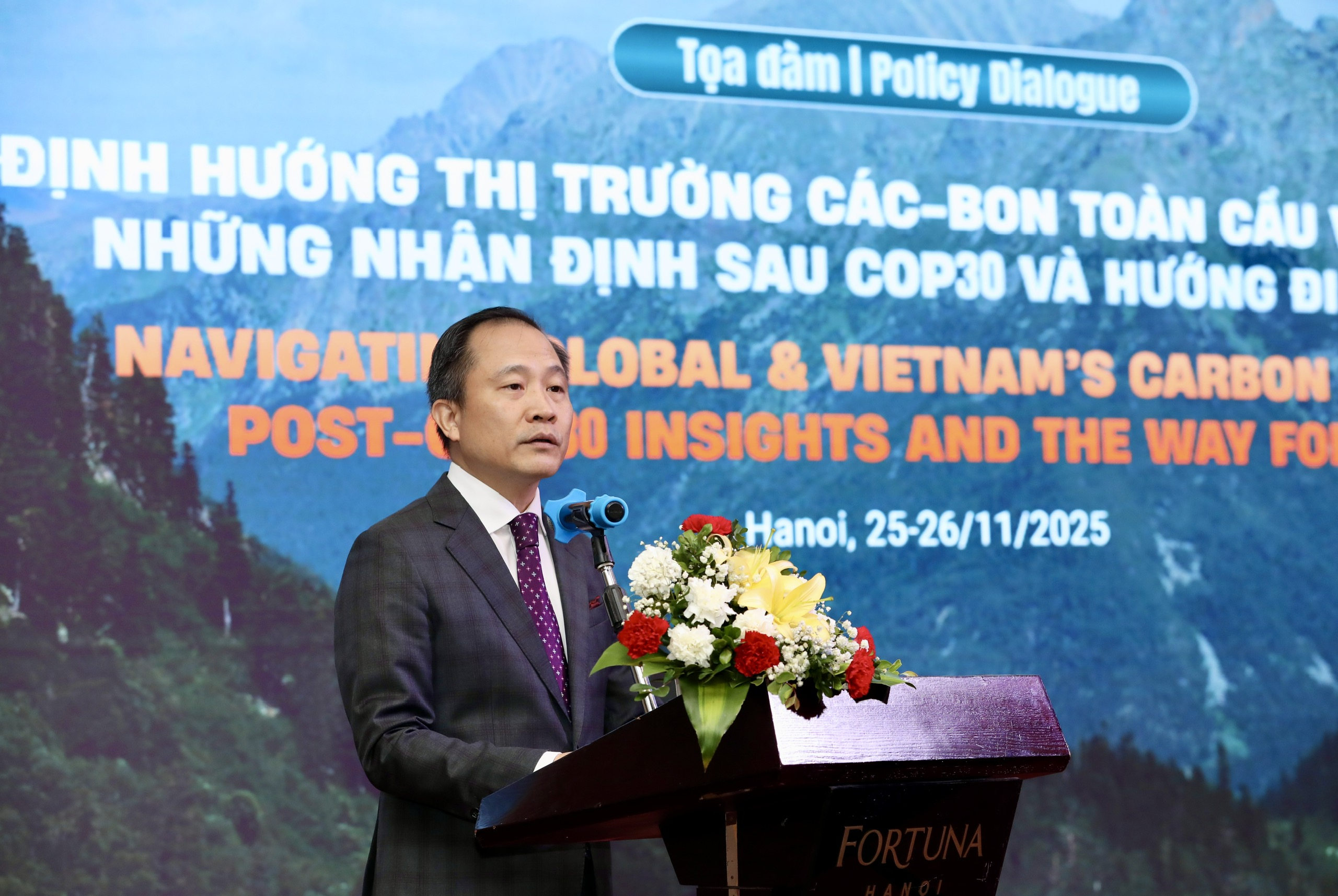
Assoc. Prof. Dr. Le Trung Thanh, Rector, University of Economics (UEB) Source: netzero.vn
In his opening remarks, Assoc. Prof. Dr. Le Trung Thanh, Rector of VNU-UEB, emphasized that the world is moving rapidly in efforts to address climate change. After COP30, new agreements, particularly the implementation of Article 6 of the Paris Agreement, have opened a crucial phase for the global carbon market. This provides a foundation for nations, businesses, and the scientific community to participate more strongly in achieving net-zero emissions. In this context, Vietnam is preparing to enter the domestic carbon market operation phase in 2028, while actively integrating into international credit exchange mechanisms. Research from the IPCC (2023), World Bank (2024), and CIFOR-ICRAF (2024) all confirm that carbon markets are an important tool for reducing emissions, promoting green economic development, and mobilizing additional resources for developing countries.
Assoc. Prof. Dr. Le Trung Thanh noted that this year’s workshop aims to connect scientists with policymakers, businesses with development support organizations, and Vietnam with the new generation of global carbon trends. He affirmed that the University of Economics – Vietnam National University focuses on enhancing research capacity, training high-quality human resources, and developing a knowledge ecosystem to serve the carbon market. The university is committed to continuing collaboration with the government, business community, and international partners to build a transparent and effective carbon market system, balancing economic, environmental, and social benefits, aiming for Net Zero by 2050.
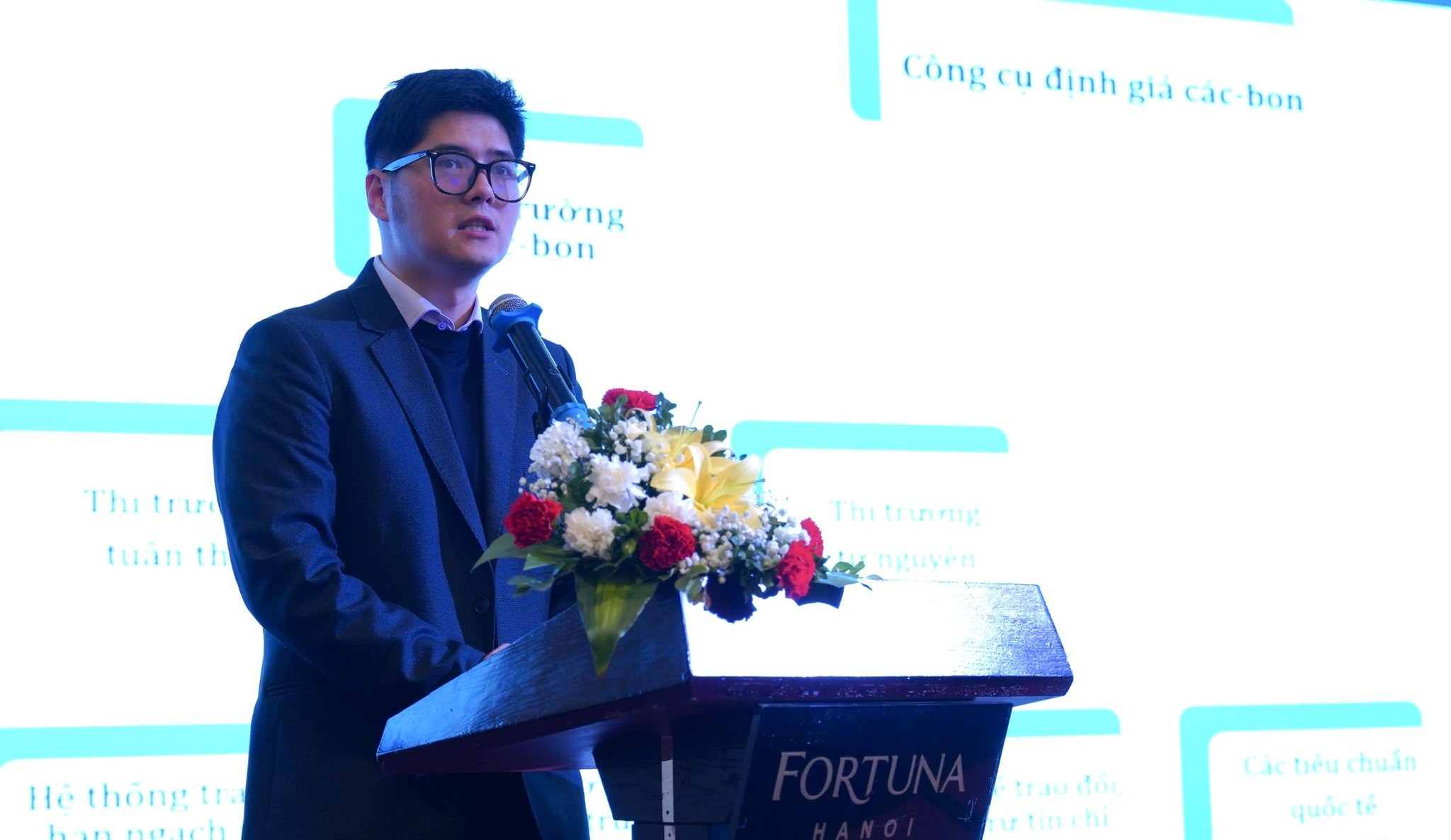
Mr. Nguyen Thanh Cong, Representative of the Ministry of Agriculture and Environment Source: Khoa Kinh tế Phát triển - UEB - VNU
Representing regulatory authorities, Mr. Nguyen Thanh Cong – Deputy Head of the Carbon Market Department (Ministry of Agriculture and Environment), reported that Vietnam’s carbon market is being developed in three phases: preparation, pilot, and official operation. The current pilot phase focuses on high-emission sectors such as steel, cement, and thermal power. Approximately 150 enterprises will participate and initially receive 100% of allowances for free.
The market mechanism allows businesses to borrow up to 15% of the next period’s allowances, carry forward unused allowances, and use carbon credits to offset up to 30% of allocated allowances. Transactions are conducted on the carbon trading exchange. To date, Vietnam has 258 registered projects under the Clean Development Mechanism (CDM), 77 of which have been issued credits totaling more than 25.67 million credits. Under the Joint Credit Mechanism (JCM) with Japan, Vietnam has 48 registered projects and more than 817,000 credits issued.
The credit issuance process includes methodology selection, project design documentation, validation, registration, monitoring, verification, and credit issuance. For businesses, preparatory steps include greenhouse gas inventory, participation planning, capacity building, and establishing a monitoring system according to new requirements.
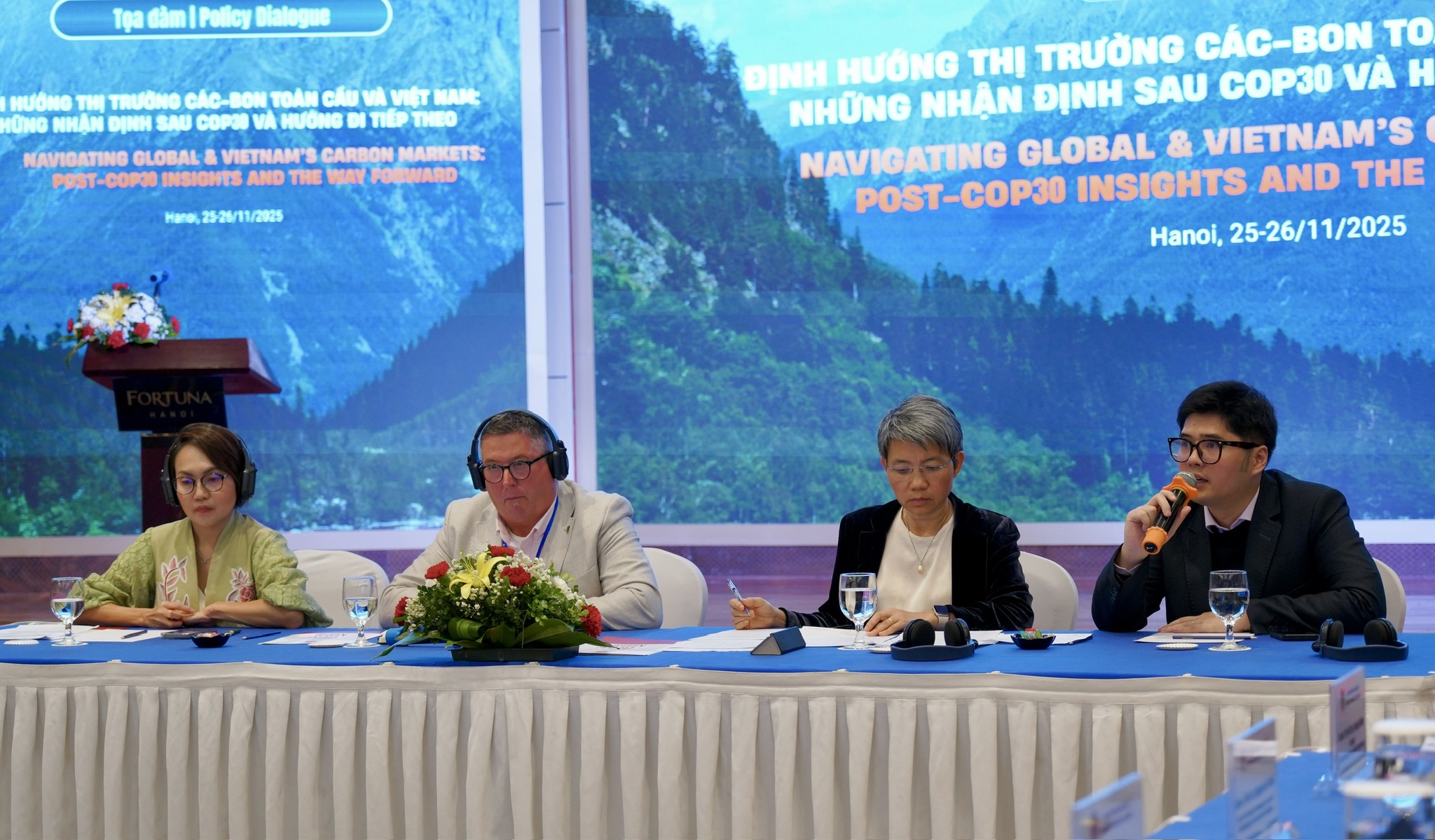
Experts Answering Participant Questions Source: Khoa Kinh tế Phát triển - UEB - VNU
From an international perspective, Dr. Beria Leimona (Center for International Forestry Research – CIFOR) highlighted that the world needs enormous capital to drive emission reductions, climate adaptation, and biodiversity conservation. The period up to 2030 requires annual investments of USD 6.3–6.7 trillion, including USD 800–900 billion from governments, USD 1–1.2 trillion from businesses, and USD 490–610 billion from international sources. The carbon market is seen as an important channel to mobilize private capital, complementing public resources.
In the first to third quarters of 2024 alone, the world raised approximately USD 14 billion for new carbon credit projects. Nature-based carbon removal credits are the most attractive group. A notable trend is that credit quality is increasingly linked to price. Independent rating organizations play a significant role in assessing project quality. High-rated credits often achieve better prices, reflecting a market shift toward integrity and efficiency. Buyer preferences in the voluntary market are also changing: they prioritize removal credits over emission reduction credits. Green carbon credit prices continue to rise strongly in 2024–2025. Simultaneously, the global market is becoming increasingly complex, with the expansion of credit insurance products and reinsurance models to reduce risk and increase investment scale.
COP30 recorded several important decisions, including the launch of the “Open Alliance for Mandatory Carbon Markets,” confirming governments’ coordinating role in building transparent and cross-border connected carbon markets. Rules under Article 6 of the Paris Agreement continue to advance, aiming to standardize MRV, carbon leakage, sustainability, and forest/land credit measurement methodologies. However, challenges remain: the Article 6.4 mechanism is incomplete, UN-supported governance mechanisms are insufficient, and concerns exist regarding unequal market access for developing countries. Regulations related to the Carbon Border Adjustment Mechanism (CBAM) continue to spark debate.
In the land-use and forestry sector, experts noted both high opportunities and risks. REDD+, PES, and nature-based credits are expected to gain a strong position in compliance markets. However, high integrity standards may prevent many remote communities from participating. The risk of markets favoring large corporations over local communities must be considered. Experts recommend strengthening national-local MRV systems, ensuring transparent benefit-sharing, and adjusting on-ground actions to align with the emerging market structure.
Closing remarks at the conference, speakers agreed that the future of Vietnam’s carbon market depends on cooperation, technology, and proactive business participation. The carbon market is not only a climate tool but also an economic opportunity, requiring a complete legal framework, a reliable MRV system, and strong private sector engagement. With the foundations being established, Vietnam is expected to become a new regional highlight in the carbon market.
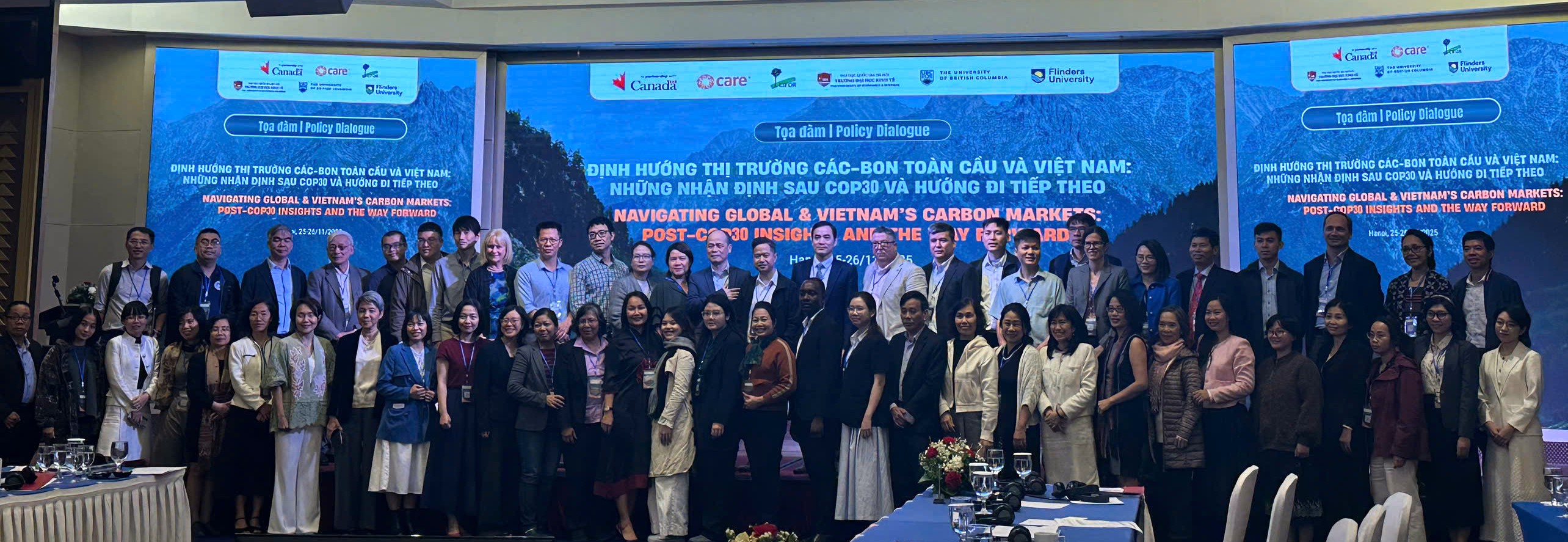
Closing of the Conference
The Minh
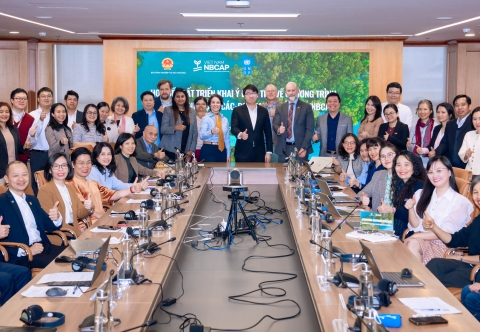 Meeting to propose the implementation of the Letter of Intent for the National Green Carbon Action Partnership Program (NBCAP)
Meeting to propose the implementation of the Letter of Intent for the National Green Carbon Action Partnership Program (NBCAP)
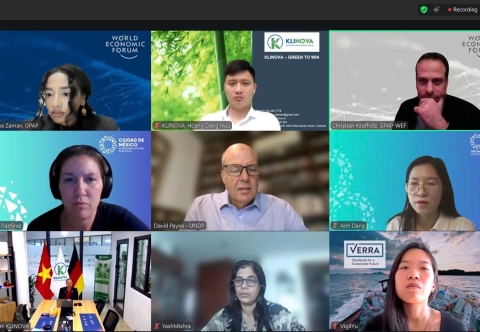 Online Workshop on the Financing Roadmap for Plastic Action to 2030: Mobilizing USD 8.5 Billion for Viet Nam’s Circular Economy
Online Workshop on the Financing Roadmap for Plastic Action to 2030: Mobilizing USD 8.5 Billion for Viet Nam’s Circular Economy